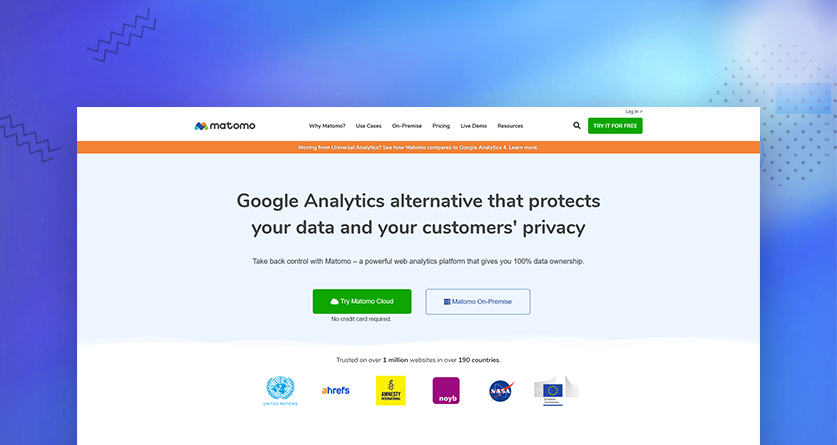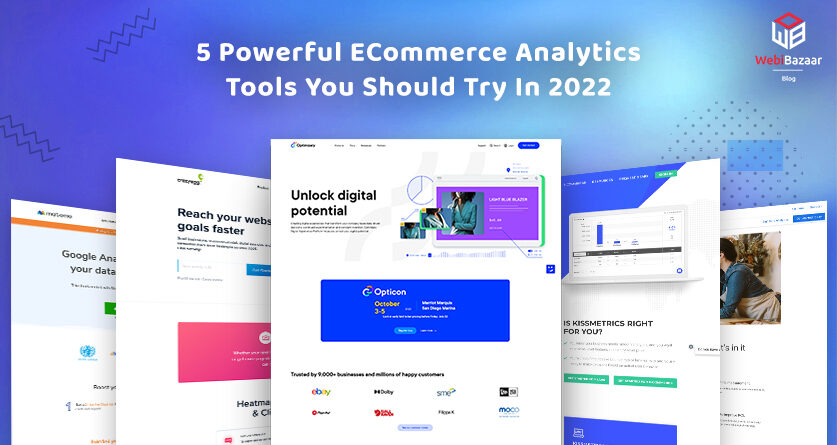Ecommerce Analytics Tools collect data for your online store that helps you make decisions and skyrocket your sales. Various advanced tools can make your work easier and more fun.
These tools help measure your business’s progress to stay ahead of your competition.
Choosing the right eCommerce analytics tool is essential for your eCommerce data analysis project to maximise growth and profit.
These tools are generally used by eCommerce professionals and sometimes by inventory managers.
They help companies identify their least minor, most performing products and help track eCommerce.
What are the best 5 eCommerce analytical tools for online business
1. Optimizely

Optimizely is an experimentation platform that helps developers build and run A/B tests on websites.
Using A/B testing and experimentation creates a more authentic experience and can be an effective place to start your eCommerce data analysis project.
Features of Optimizely
- It serves various buyer personas.
- Built-in easy-to-interpret editor
- Compatible with multiple platforms
- Easy to use: it gives you smooth implementation and helps set up campaigns and events for the customer you are aiming for.
- Custom targeting, audience prioritisation, custom templates, a visual editor, developer tools, and APIs.
- Easy to integrate – large enterprises can create experiments using A/B test experts without hassle.
One must consider the pricing factor before opting for this tool, as optimized is not that affordable, and plans depend on business size, subscription length, and whether it’s full-stack or web.
It is best for business owners who want to experiment implementation of new things on their websites.
2. Crazy Egg

Crazy Egg is an online tool that monitors individual pages from your website, giving you a breakdown of where different visitors have clicked and on which part of the screen.
It is famous for the variety of heat maps that it offers.
The click of a mouse cursor forms heat maps on the website, and from this information collected by heat maps, you can see the sources from where the website is nourishing.
Features of crazy egg
- It is beneficial for A/B testing and helps visualise any possible change in the site.
- Best for a business that wants to track its visitor interaction and conversion rates.
- Helps improve the site by working on pages with low customer interaction and finding the root cause.
Also Read: 15 Features Of Shopify Themes That Make Everyone Love It
3. Google Analytics

Google Analytics is a web analytics service offered by Google. If you are a beginner to eCommerce analytics tools, it is the best way to start it is free of cost and easy to use.
It gives you an enormous amount of information that is helpful to you, such as who is visiting your website, what they are looking for, and the sources by which they are getting to your site
Features of Google Analytics
- Customer-centric measurements – discover the pages on which customers spend the most time and the pages with the highest bounce rates.
- More brilliant insights – new insights to anticipate customer behaviour; you can analyse this data to make things work for you
- Weak areas – it helps find more vulnerable areas of your website
- The report is shareable and easy to work on.
- It comes with a search console tool
- that makes a complete package for e-commerce entrepreneurs.
4. Kissmetrics
 Kissmetrics is a person-based analytics product. It reaches deeper individual levels rather than working on broad spectrums of your website.
Kissmetrics is a person-based analytics product. It reaches deeper individual levels rather than working on broad spectrums of your website.
It helps you identify, understand, and improve the metrics that drive your online business and now you can answer all the questions, such as no of times a customer clicked on your page; this helps in remarketing and deriving various strategies for the website and helps improve it.
Features of Kissmetrics
- Make more intelligent decisions: it helps you navigate your business decisions and tell you the adjustments are working in favour and making profits.
- Effectiveness of marketing channels – it tells you the source of your customers that directly identifies the marketing strategies that are working for you.
- Time user takes to convert – how long a customer takes to buy and flip, or it remains a potential customer.
- Engagement metrics – these tools should be best used for business professionals who want to tap customers on a one-to-one basis.
5. Matomo

Earlier known as Pikwik, it is an open-source option for your eCommerce website. It has the same analytical features as google Analytics with some additional features.
This best suits business owners looking for budget-friendly analytical tools and helps review in-depth sales reports based on geolocation and marketing channels.
Features of Matomo
- Geolocation: locate your visitors, can view visitor statistics on the world map
- Use segmentation: analyse reports on smaller groups of audiences based on specific countries and market strategies.
- Detailed performance report: reports detailed metrics of each page
- Goal conversion tracking: Events that help in identifying the reason for abandoned carts
Also Read: 15+Best Responsive & Fastest Shopify Themes Will Boost Your Sales
Now that we have discussed the best eCommerce analytics tools, you can choose the best tools suited for your eCommerce website.
They should align with your goals and budget, and they should be able to solve your business problem in the most effective way possible.
These tools play a significant role in decision making, strategic planning, construction business plans, and, most importantly, for the success of your website, so it should be chosen carefully considering all the factors.
More Blogs:
What Is Different Between Classic Marketing And Digital Marketing?
